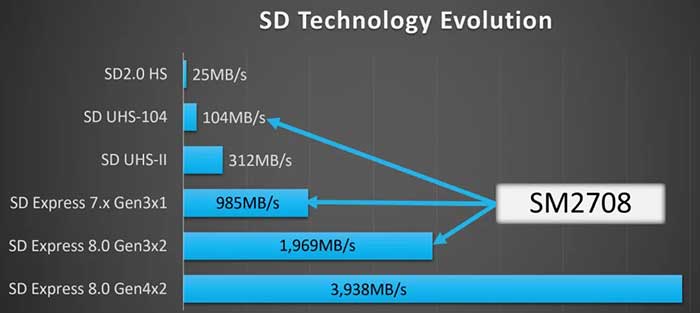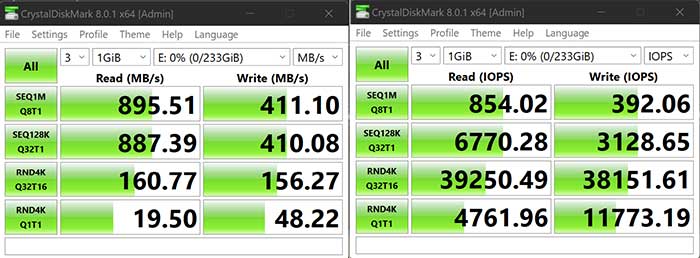HEXUS first published a news report on the coming tide of SD Express cards back in June 2018, and at last they are nearing a release date, with the first products expected to arrive at retailers later in 2021. Earlier this year, there were two significant developments in the commercialisation of SD Express (SD 7.0); Phison presented its PS5017 controller / platform in Feb, and Silicon Motion (SMI) launched the SM2708 controller in April.

The first third party tests have now been published, with an MSI branded SD Express card being put through tests by the storage experts at The SSD Review. This memory card features the SM2708 SD Express controller, which supports the current UHS-1 standard as well as PCIe Gen 3.0 x 2. It can be accompanied by the latest 3D NAND memory and with NAND flash interface support up to 1200MT/s, support up to Gen 3 x 2 lanes for theoretical speeds up to 1,969MB/s – and hence is good enough for SD 8.0 spec support, going forward (see chart above). Additionally, the flexible SM2708 is fully backwards compatible with the UHS-1 standard and supports PCIe 3.0. The card pinout is such that if <1.8V is available, it flips back into UHS legacy mode.

Test data from The SSD Review.
Getting into the test data from The SSD Review, their 256GB sample card achieved 857MB/s read and 394MB/s write speeds in the ATTO Disk Benchmark. In CrystalDiskMark the memory card managed 895MB/s reads and 411MB/s writes. In both tests the card achieved close enough to its maximum read speeds potential (due to overheads) but the half speed writes were explained by the test-card's use of 2-plane flash. With 4-plane flash available, write speeds could be doubled.
SD cards need to advance like this to be adopted by the likes of digital photo and video enthusiasts, who have been enticed to CF Express Type B cards offering transfer speeds of up to 1,750MB/s. Current gen SD cards can only muster around 300MB/s, so SD Express 7.0 and 8.0 are going to be significant leaps forward. The SSD Review says that as well as the sample SD Express card it got hold of, it is expecting the likes of Lexar and Adata to be competitors. It adds that microSD Express cards are being developed in tandem with these regular sized cards, but the micro-versions will be limited to 1GB/s due to physical size/pin restraints.













